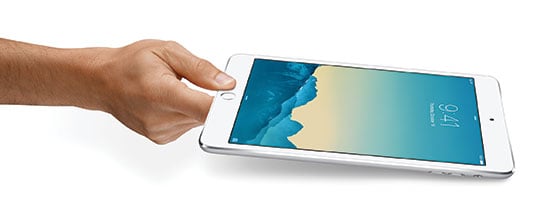This article is more than 1 year old
Apple's new iPADS have begun the WAR that will OVERTURN the NETWORK WORLD
It'll get properly serious once Google comes in
Choosing the rules of the Beauty Contest
The key difference in a soft-SIM world is that you select, via a “ballot screen” which network operator you'll use. Who gets to choose who goes in this list? Apple does, from a pre-approved list chosen by Apple. In short, we’ve replaced the backroom technocrat at the General Post Office or Bell with a backroom technocrat at Apple - or, soon, at Google. But instead of a network monopoly choosing what device you'll use, a device duopoly will choose what network you use.

Doesn't look different - but it carries the seed of global domination
So, what criteria will that backroom gatekeeper use? What are the rules of the beauty contest? Apple is fairly apolitical about networks, but Google isn't: it's highly political. In fact, it is in the network game itself (with Google Fiber for instance).
Apple just wants to sell you more stuff. Google’s vision is much broader: it wants to see a world where bits can’t be monetised by anyone else and so Google accrues the value of the data flowing over the world's networks via its giant advertising and data processing business.
It isn’t hard to imagine a network failing Google’s beauty contest – on some arbitrary Google-devised rule.
Perhaps, say, the network operator wants to run its own ad network? Do you think that Google - now it's in the gatekeeper role - is going to like that? Or do you suppose it might fire up its academics, think tanks and "digital rights" sockpuppets, and cry foul that the "open mobile web" is under attack (or some such highly emotive rallying cry)?
Another huge question is – how easily will Apple or Google permit you to switch? Can you switch without registering, which was the idea behind the SIM? Will you be able to switch daily? Or perhaps even, as David Cameron dreamed, in real-time, based on signal strength - or price.
The implications are enormous, for both incumbents and regulators. With Apple and Google in charge, telecoms industry best practice and standards could now be driven by two companies. The business of the operators could be completely upended. Their huge investment in retail presence, branding and services (BT, Sky) would potentially count for nothing.
Gesture Politics and the art of regulation
No doubt some will rejoice, because Apple or Google can do no wrong, and every network provider is by definition wicked. But this is a child's view of the world, and parents always pay the bill. The US net neutrality debate is really an argument about who sends the bill to the punter – because the punter will hate whoever’s name is at the top of the bill. It’s about avoiding blame.
The danger in making decisions based on the prejudices you hold today is that those decisions can have very unpleasant consequences for tomorrow, when you’re no longer around. Ultimately we get the networks we pay for, and somebody has to invest billions in infrastructure if the radio boffins' latest technology is to move from the labs to the mass market. Google and Apple have no incentive or inclination to play in that game. As Intel and Clearwire found out with WiMAX, it’s an expensive proposition. Investors hate risk, and when customers can switch operators and technologies in real-time the investment may dry up.
Regulators may also need to step up to the plate and make some unpopular decisions. Writing in a postscript to his history of the mobile industry, Stephen Temple - the British civil servant who helped create the GSM standard in the 1980s - had a warning. Super-profits generate super investment. But if nobody makes money, we have a problem.
“The European model for the mobile radio market there is a single minded regulatory pursuit of ever lower prices – where mobile operator profits are not only competed away and but also regulated away. This happens without regard to where the money is going to come from for substantial investments in R&D, new generations of mobile networks and universal coverage from those new networks," Temple writes.
Google and Apple make super-profits – but show no sign of ploughing them back to infrastructure. What’s that you say? Sorry, I can’t hear you - this line is terrible. I’ll have to call you back ... ®
Bootnote
Our own Bill Ray described the nano-SIM as the "last SIM card you'll ever use" - a pretty good prediction.
